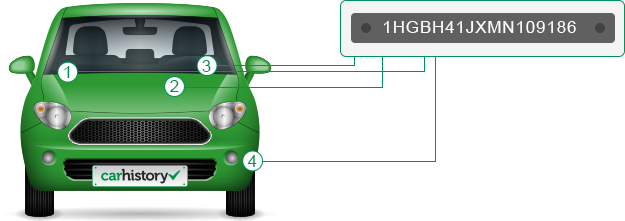
The vehicle identification number (VIN) is composed of 17 characters (digits and capital letters) that act as a unique identifier for the vehicle. A VIN displays the car's unique features, specifications and manufacturer.
The VIN can be found in a couple of places including on the car's registration label (1), on the compliance plate in the engine bay (2) or on the passenger side windshield (3), or on one of the door posts (where the door latches when it is closed) (4). See the image below:
Are you thinking about buying a used car over the Christmas period? There will likely be a record number of new car sales through the year when 2016 ends1, and that means more people are moving on from their old models. However, it's easy to find a car that only ticks half of the boxes on your list - how can you tell that it's in really good condition - the condition claimed in the advertisement? With a CarHistory report you can find out details on whether it has been previously written-off .
When you inspect a car, however, you might notice some strange spots of paint or the odd bit of damage. How can you tell what's major and what's just a scratch? If a car has been involved in a big collision, there might be permanent damage that the seller is not disclosing.
To learn how to spot when a car has been involved in a collision, major or minor, check out our list below:
1) Bent parts in the engine bay
Lift the bonnet of a car you're inspecting and you'll get a good picture of how well the car has been looked after.
Lift the bonnet of a car you're inspecting and you'll get a good picture of how well the car has been looked after. If it's all greasy and there seem to be covers missing, there might have been some neglect in the car's life. Further, if you look right at the front of the engine bay, you may notice that there are parts that are bent out of shape2.
A common cause of this is a head-on collision. It might be running into the back of a parked car, or a major smash on the roads, but there will be lasting evidence of a hit of this nature around the engine. It doesn't spell doom for the car, but it might end up costing you more than you expect. Check out the engine bay carefully before you hand over your money. The front body panels are easy to fix, but the engine parts are not, so while it could look fine cosmetically, it may well be a mechanical disaster.
2) Bad paint work
If you spot bad paint work around the body of the car, it may mean that someone has tried DIY work2. If they've scraped something sharp, there will be deep scratches in the body panels - good automotive paint is protective, but cheap jobs done at home without professional equipment will not offer any layers of protection. In small collisions on these patches, the alternative paint will peel away, leaving you with unsightly scratches and expensive touch-up work to organise.

3) A few loose screws
Loose screws might not seem like a big deal, because replacement plastic parts are cheap and easy to find. However, they can indicate something far more serious2. If there are screws missing from fenders and body panels around the car, it might mean that there has been an accident at some point, and the people who put the car back together missed a few parts2.

The fact that the parts are missing is not the problem, it's the potential damage that you can't see - damage from the collision - that's going to cause trouble.
4) Terrible online reviews
There are always bad apples, and these people can end up costing you a lot of money.
When buying from a large dealer, or at least someone who regularly lists cars for sale, make sure to ask around online for reviews of the business or individual. A lot of dealers are fantastic, and very responsible. They'll make sure you don't get a lemon, and that you're looked after when on the road.
However, there are always bad apples, and these people can end up costing you a lot of money. Buy a car from a disreputable dealer and you might be setting yourself up to spend thousands and thousands after driving for just a few weeks. That's not what you want from your new ride!
Ask friends, or post in online forums for advice. It will come thick and fast. For more help finding out all you can about a second-hand car before buying it, make sure you get in touch with CarHistory for a report.
1. Roy Morgan Research. 2016 likely to set a record for car sales – but what's in store for 2017? Accessed December 2016.
2. Autos Cheat Sheet. 9 signs that a used car has been involved in an accident. Accessed December 2016.